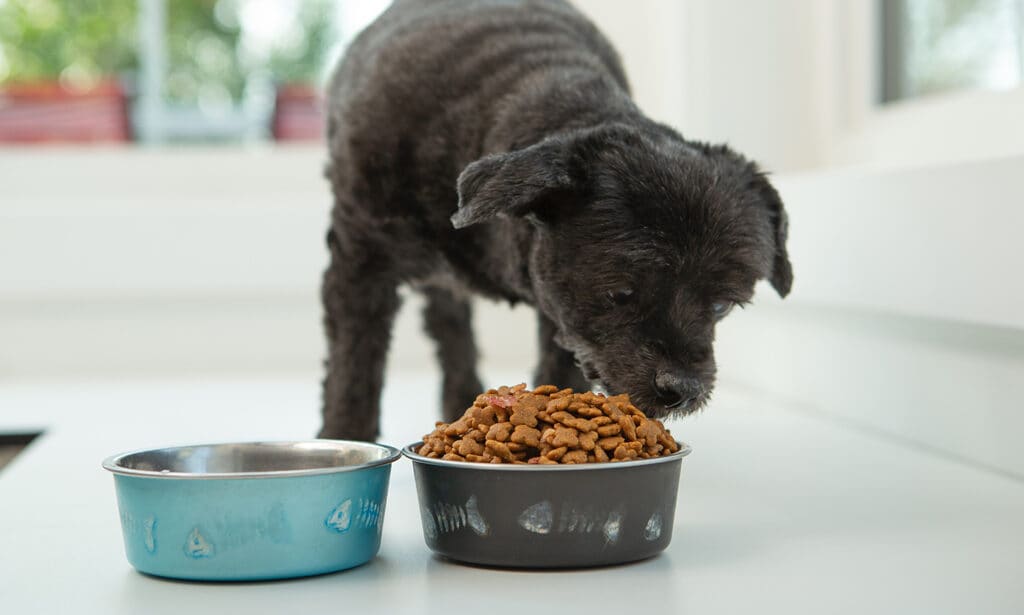As dogs age and enter their senior years, their body undergoes various changes. Their activity level may slow, and new health issues can arise. One of the most important aspects of maintaining a senior dog’s well-being is their diet. But does that mean switching to a specific senior dog food is necessary?
You might be surprised to learn that most senior dogs don’t need a specialized senior diet. However, there are certain cases where health conditions could make switching to a senior formula beneficial.
We spoke to two veterinarians to learn all about senior dog diets and what to consider when feeding a dog in their golden years.
In This Guide:
What Is a Senior Dog Diet?
When shopping for dog food, you’ve probably noticed formulas that have “senior” on the label. While you might assume these foods contain specific nutrients for older dogs, that’s not necessarily the case.
According to Joseph Wakshlag, DVM, PhD, DACVSMR, DACVIM (Nutrition), professor of clinical nutrition at Cornell University College of Veterinary Medicine in Ithaca, New York, there are no defined nutrient requirements for senior dogs, so manufacturers aren’t required to follow a standardized nutrient list.
As a result, senior dog foods can vary significantly in their ingredients and nutritional content, and can be quite similar to adult dog formulas.
That said, senior dog foods often differ from adult formulas in a couple of ways:
- They offer lower calories.
- They include targeted supplements.
What Do Senior Dogs Need in Their Diet?
As dogs get older, their dietary needs may shift to support their changing health, though the specific requirements will vary from one dog to another.
Generally speaking, some of the most common factors to consider in a senior dog’s diet include:
Increased Protein
Protein is essential for building and maintaining muscle, and, as dogs age, their body becomes less efficient at synthesizing it, which may increase the need for more protein in their diet. According to studies, healthy senior dogs need about 50% more protein than adult dogs.
Some senior dog food formulas, however, reduce the protein and fat content to lower the calorie count, and this type of dog food may not be best for every senior dog. So, talk to your vet to ensure your senior dog is getting the right amount of protein for their specific needs.
Fewer Calories
Senior dogs are generally less active, so reducing their daily calories (either by reducing their food intake or switching to a low-calorie dog food) may be needed to prevent weight gain, which can lead to a range of health issues, such as joint problems, heart disease, and diabetes.
Joint Support Ingredients
Dog foods with joint-supporting nutrients, such as glucosamine, chondroitin, and omega-3 fatty acids like eicosapentaenoic acid (EPA) and docosahexaenoic acid (DHA), can be helpful for aging dogs who need the extra nutritional support to maintain joint function and mobility.
Types of Senior Dog Food
As with puppy and adult dog foods, there are a few different types of senior dog food to consider, each with its own pros and cons.
Dry Dog Food
- Pros: Dry dog food is convenient, easy to store, and helps promote dental health by reducing plaque and tartar buildup.
- Cons: It may be difficult for dogs with already-existing dental issues to chew. It also has a lower moisture content, which can be a concern for dogs who need more hydration.
Wet Dog Food
- Pros: Wet dog food has a high moisture content, which reduces calorie density and supports hydration. It also has a softer texture and is often more appetizing to senior dogs with a decreased appetite. (Finding the best wet dog food for senior dogs can help address these specific needs.)
- Cons: It tends to be more expensive than dry food and needs to be stored in the refrigerator once opened.
Specialty Dog Food
- Pros: Specialty dog foods can be either wet or dry. These options are tailored to specific health concern, such as joint support, weight management, or digestive health.
- Cons: They can be more costly and may require a prescription from your veterinarian.
Dog Food for Common Health Issues in Senior Dogs
Dogs can face certain health issues as they age, many of which can be supported with dietary adjustments. Here are vet-recommended senior dog foods that provide nutritional support for a healthy dog.
Before making any changes to your dog’s diet, always talk to your veterinarian. They can assess your dog’s specific needs and recommend the best food for their overall health and well-being.
Obesity
For senior dogs struggling with weight management, a low-calorie, high-fiber diet is ideal.
Wayne Johnson, VMD, a veterinarian at Birdneck Animal Hospital in Virginia Beach, Virginia, suggests Blue Buffalo® Life Protection Formula® as a good option.
“It’s lower in fat and calories to help keep your senior dog at a healthy weight, and the extra fiber helps them feel satisfied between meals,” he says.
Mobility and Joint Issues
For older dogs with mobility or joint concerns, senior dog foods that have joint-supporting nutrients can be a game changer, Dr. Johnson says.
One of the best senior dog foods in this realm is Royal Canin® Large Aging 8+ Dry Dog Food, which contains added glucosamine, antioxidants, and omega-3 fatty acids to support healthy joint function.
For small and medium dogs, consider Purina® Pro Plan® Senior 7+ Dry Dog Food, which contains omega-3s and glucosamine for joint health.
Sensitive Stomach
Senior dogs with digestive issues often do well on a limited-ingredient diet that avoids common allergens and fillers.
One vet-recommended sensitive stomach dog food for seniors is Purina Pro Plan Sensitive Skin & Stomach 7+ Dry Dog Food. It contains salmon as the first ingredient and includes rice, oatmeal, and prebiotics to support digestion. It’s also free from common allergens and irritants, including eggs, soy, corn, wheat, poultry meal, and added colors and flavors.
Kidney Disease
For dogs with kidney disease, a specialized diet is often recommended to reduce the workload on the kidneys, explains Dr. Johnson.
He recommends Hill’s® Prescription Diet® k/d Kidney Care Dry Dog Food as one of the best options for dogs with chronic kidney disease. While not labeled as a “senior” food, it’s likely still a good choice for your senior dog (but get your vet’s approval and authorization, of course). It features ActivBiome+® Kidney Defense, a proprietary blend of prebiotics designed to activate the gut microbiome and help protect kidney function.
Heart Disease
“Foods designed for heart health usually have lower sodium levels to help manage blood pressure and include added taurine, arginine, and carnitine, which are great for supporting heart muscle function,” Dr. Johnson says. “Omega-3s are also a key ingredient, helping to reduce inflammation and promote cardiovascular health.”
Dr. Johnson says Royal Canin Veterinary Diet Early Cardiac Dry Dog Food made for adult dogs (including seniors) is a solid choice for dogs with early stage heart issues. It ticks all the boxes of being lower in sodium and containing taurine, arginine, L-carnitine, and omega-3s to keep the heart muscle strong.
Cognitive Decline
Dogs experiencing canine cognitive dysfunction (CCD) can benefit from a diet rich in antioxidants, omega-3 fatty acids, and MCT (medium-chain triglycerides). These nutrients support brain function and help slow cognitive decline.
One highly rated, vet-recommended option is Purina Pro Plan Bright Mind® 7+ Dry Dog Food. It contains several brain-boosting nutrients, including enhanced botanical oils, DHA, EPA, antioxidants, B vitamins, and arginine.
Dental Disease
Senior dogs often face dental issues like plaque buildup, gum disease, or tooth loss, which can make chewing more difficult. A diet that supports dental health, such as dry kibble designed to reduce plaque or specially formulated dental treats, can help.
Eukanuba® Senior Lamb 1st Ingredient Dry Dog Food is a vet-recommended choice. It’s formulated to reduce tartar buildup and offer complete nutrition.
As for wet food, feeding half wet dog food for senior dogs and half dry food could be a good approach for your dog. Ask your vet.
When To Switch To Senior Dog Food
Small dogs are typically considered seniors at 10–12 years old, medium dogs at 8–9 years, and large breeds around 6–7 years. However, the decision to switch to senior food should be based on your dog’s individual needs, not their age, Dr. Wakshlag says.
If your dog is healthy and active with no signs of age-related health issues—like reduced activity, weight changes, or cognitive decline—switching may not be necessary. However, if aging signs emerge, feeding a senior-specific diet (with your vet’s guidance) may be helpful.
When transitioning your dog to a new food, it’s important to do it gradually to avoid digestive upset.
How Much To Feed Senior Dogs
The amount of food you should give your senior dog varies based on their age, size, activity level, and health conditions, as well as the calorie density of the dog food.
As a starting point, refer to the feeding guidelines on your dog’s food label. You can also refer to the senior dog feeding chart below (it’s the feeding guide for Wellness® Complete Health® senior dry dog food at 405 calories per cup).
Ultimately, though, your vet is the best resource for determining the right portion size for your senior dog.
Also, keep in mind, senior dogs don’t necessarily need fewer calories than an adult dog unless they’re starting to gain weight.
Never put your dog on a diet without the guidance of your vet, as it’s important to rule out underlying medical conditions that could be causing or contributing to your dog’s excess weight.
6–20 pounds
½–1¼ cups
20–35 pounds
1¼–1¾ cups
35–50 pounds
1¾–2½ cups
50–65 pounds
2½–3 cups
65–80 pounds
3–3½ cups
80–95 pounds
3½–4 cups
95–115 pounds
4–4½ cups
Supplements for Senior Dogs
While supplements are sometimes included in senior dog food, this isn’t always the case. Targeted supplements help to maintain and support joints, mobility, and digestion as your dog ages.
Ask your vet about:
- A joint supplement, such as Nutramax® Cosequin®, which contains glucosamine, chondroitin, MSM, and omega-3s.
- A fish oil supplement, such as Nutri-Vet® Fish Oil Softgels, to support joint, brain, immune system, and coat health.
- A probiotic supplement, such as Purina Pro Plan Veterinary Supplements FortiFlora® Powder, to support digestive health.
Share:





















